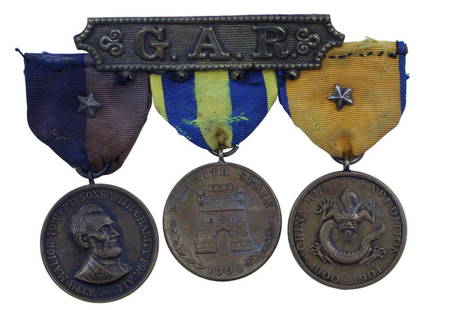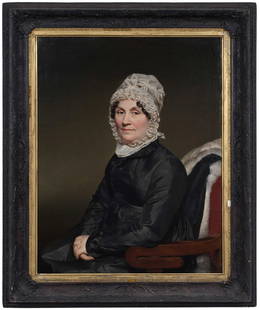
Oliver Otis Howard, Union Major General, 3rd Maine Infantry Regiment, Army of the Potomac, Medal of
Similar Sale History

Recommended Items













Item Details
Description
- Oliver Otis Howard, Union Major General, 3rd Maine Infantry Regiment, Army of the Potomac, Medal of Honor Recipient- The Autobiography of General Oliver Howard Otis, Medal of Honor Recipient, inscribed. Rare. 2 volumes, both ex library but minimal markings. From Wikipedia: Howard was appointed colonel of the 3rd Maine Infantry regiment and temporarily commanded a brigade at the First Battle of Bull Run. He was promoted to brigadier general effective September 3, 1861, and given permanent command of his brigade. He then joined Maj. Gen. George B. McClellans Army of the Potomac for the Peninsula Campaign. On June 1, 1862, while commanding a Union brigade in the Fair Oaks, Howard was wounded twice in his right arm, which was subsequently amputated. (He received the Medal of Honor in 1893 for his heroism at Fair Oaks.) Brig. Gen. Philip Kearny, who had lost his left arm, visited Howard and joked that they would be able to shop for gloves together. Howard recovered quickly enough to rejoin the army for the Battle of Antietam, in which he rose to division command in the II Corps. He was promoted to major general in November 1862 and assumed command of the XI Corps the following April, replacing Maj. Gen. Franz Sigel. Since the corps was composed largely of German immigrants, many of whom spoke no English, the soldiers were resentful of their new leader and openly called for Sigel's reinstatement. At the Battle of Chancellorsville, Howard suffered the first of two significant military setbacks. On May 2, 1863, his corps was on the right flank of the Union line, northwest of the crossroads of Chancellorsville. Robert E. Lee and Lt. Gen. Thomas J. Stonewall Jackson devised an audacious plan in which Jacksons entire corps would march secretly around the Union flank and attack it. Howard was warned by Maj. Gen. Joseph Hooker, now commanding the Army of the Potomac, that his flank was in the air, not anchored by a natural obstacle, such as a river, and that Confederate forces might be on the move in his direction. Howard failed to heed the warning and Jackson struck before dark, routing the XI Corps and causing a serious disruption to the Union plans. At the Battle of Gettysburg, the XI Corps, still chastened by its humiliation in May, arrived on the field in the afternoon of July 1, 1863. Poor positioning of the defensive line by one of Howards subordinate division commanders, Brig. Gen. Francis C. Barlow, was exploited by the Confederate corps of Lt. Gen. Richard S. Ewell and once again the XI Corps collapsed, forcing it to retreat through the streets of Gettysburg, leaving many men behind to be taken prisoner. On Cemetery Hill, south of town, Howard quarreled with Maj. Gen. Winfield S. Hancock about who was in command of the defense. Hancock had been sent by Maj. Gen. George G. Meade with written orders to take command, but Howard insisted that he was the ranking general present. Eventually he relented. Controversy centers on three points: 1) Howard's choice of Cemetery Hill as the key to defense; 2) the timing of Howard's mid- afternoon order to abandon positions north and west of town; and 3) Howard's reluctance to recognize that Hancock, his junior, had superseded him. Historian John A. Carpenter holds that Howard alone had wisely selected Cemetery Hill, that the order to withdraw was probably a sound one, and that the conflict between Howard and Hancock might have been avoided had Meade himself gotten onto the field. Howard started circulating the story that his corps failure had actually been triggered by the collapse of Maj. Gen. Abner Doubledays I Corps to the west, and this was a partial reason for Doubleday's removal from command of the corps. However, this excuse was not accepted by history—the reverse was actually true—and the reputation of the XI Corps was ruined. Some argue that Howard should get some credit for the eventual success at Gettysburg because he wisely stationed one of his divisions (Maj. Gen. Adolph von Steinwehrs) on Cemetery Hill as a reserve and critical subsequent defensive line. For the remainder of the three-day battle, the corps remained on the defensive around Cemetery Hill, withstanding assaults by Maj. Gen. Jubal Early on July 2 and participating at the margin of the defense against Picketts Charge on July 3. Also at Gettysburg, Howard's younger brother, Major Charles Henry Howard, served as his aide-de-camp. Howard and XI Corps were transferred to the Western Theater with fellow general Henry Slocums XII Corps to become part of the Army of the Cumberland in Tennessee; they were commanded once again by Fighting Joe Hooker. In the Battles for Chattanooga, the corps joined the impulsive assault that captured Missionary Ridge and forced the retreat of Gen. Braxton Bragg. In July 1864, following the death of Maj. Gen. James B. McPherson, temporary command of the Army of the Tennessee was given by order of William Tecumseh Sherman to the ranking officer on the field that day, Major General John A. Logan. Shortly after the success at the Battle of Atlanta, Sherman (who favored granting command to a West Point graduate) appointed Howard to permanent command of the Army of the Tennessee. At the closing of his After Action Report filed by Major General John A. Logan on September 10, 1864, Logan referred to his having served as Commander of the Army of the Tennessee for a scant four days. Logan's detailed report ended with: I withdrew the Army of the Tennessee the night of the 26th, and moved it along the rear of the center and right of the army to a position across Proctor’s Creek. After putting the army in position that night I was relieved by Maj. Gen. Howard. Howard subsequently led the right wing of Maj. Gen. William Tecumseh Shermans famous March to the Sea, through Georgia and then the Carolinas. Sherman, having favored Howard over Logan for permanent command of the Army of the Tennessee, recognized Logan's success at Atlanta. In recognition of the outstanding leadership Logan displayed at Atlanta, Sherman asked Howard to allow Logan to ceremonially lead the Army in the May 1865 Grand Review in Washington. Howard agreed when Sherman appealed to him as a Christian gentleman. Ultimately, by the war's end, Gen. Sherman would commend Howard as a corps commander of the utmost skill, nicety and precision.
Buyer's Premium
- 26%
Oliver Otis Howard, Union Major General, 3rd Maine Infantry Regiment, Army of the Potomac, Medal of
Estimate $340 - $700
5 bidders are watching this item.
Shipping & Pickup Options
Item located in Ottawa, IL, usOffers In-House Shipping
Local Pickup Available
Payment
Accepts seamless payments through LiveAuctioneers

Related Searches
TOP





























![[CIVIL WAR]. Confederate canteen captured at Port Hudson by Sergeant Charles F. Waldron, Co. C, 24th: [CIVIL WAR]. Confederate canteen captured at Port Hudson by Sergeant Charles F. Waldron, Co. C, 24th Maine Infantry Regiment. 7 1/4 in. dia. x 2 1/4 in. dp. wooden drum canteen with iron hardwar](https://p1.liveauctioneers.com/197/250552/130130727_1_x.jpg?height=310&quality=70&version=1654186071)
![[CIVIL WAR]. Union Infantry major's frock coat.: [CIVIL WAR]. Union Infantry major's frock coat. Navy blue seven-button double-breasted field officer's frock coat with velvet-lined standing collar and original major's should straps. Infantry eagle b](https://p1.liveauctioneers.com/197/250552/130130587_1_x.jpg?height=310&quality=70&version=1654186071)




![[CIVIL WAR] -- [UTAH TERRITORY] -- [MORMON]. Private Thomas B. Thompson letter archive, Co. D, 3rd: [CIVIL WAR] -- [UTAH TERRITORY] -- [MORMON]. Private Thomas B. Thompson letter archive, Co. D, 3rd Regiment, California Infantry, incl. Mormon and Native American content.12 letters spanning June 1861](https://p1.liveauctioneers.com/197/309287/165438814_1_x.jpg?height=310&quality=70&version=1699649440)
![[CIVIL WAR]. Quarter plate daguerreotype of Confederate Major General Carter Littlepage Stevenson as: [CIVIL WAR]. Quarter plate daguerreotype of Confederate Major General Carter Littlepage Stevenson as a Lieutenant in the 5th US Infantry. Ca 1846. Quarter plate daguerreotype. (Minor edge tarnish, few](https://p1.liveauctioneers.com/197/250551/130130020_1_x.jpg?height=310&quality=70&version=1654185975)



![[CIVIL WAR] New York Cartridge Box, DOW Chancellorsville: M1861 US Cartridge box. New York City: H.A. Dingee. WITH Original "SNY" State of New York brass plate. With original interior tin box inserts. Inner flap stamped "H.A. Dingee / N.Y." Inscribed to flap](https://p1.liveauctioneers.com/7226/325455/175169095_1_x.jpg?height=310&quality=70&version=1712370394)

![[Gettysburg] Dedication to General Reynolds: Henry Shippen Huidekoper. Address at the Unveiling of the Equestrian Statue of Major-General John F. Reynolds at Gettysburg, July 1st, 1899. N.p.: N.p., [1899]. 8vo. Original wrappers bound in contemp](https://p1.liveauctioneers.com/7226/325455/175169092_1_x.jpg?height=310&quality=70&version=1712370394)



![[Civil War Gettysburg] 107th PA ID Disc: Gilt brass "Against Rebellion" soldier's ID tag. Obverse features a patriotic shield reading "Union" with the legend "Against Rebellion / 1861." Reverse stamped "John Orth . / Co. E / 107th / Regt. /](https://p1.liveauctioneers.com/7226/325455/175169068_1_x.jpg?height=310&quality=70&version=1712370394)
![[CIVIL WAR] 64th Ohio CDV Album: Charming carte de visite (CDV) photograph album containing images of 10 members of the 64th Ohio Infantry. Several of the soldiers are identified; other cartes feature period inscriptions. Originally](https://p1.liveauctioneers.com/7226/325455/175169009_1_x.jpg?height=310&quality=70&version=1712370394)
![[CIVIL WAR] Grenville Dodge CDV Portrait: Three-quarter length albumen CDV studio portrait of Grenville Dodge. Pulaski, Tennessee: Th. Gubelman, [1864]. Photographer's imprint to mount verso alongside period ink inscription reading, "Will -".](https://p1.liveauctioneers.com/7226/325455/175169058_1_x.jpg?height=310&quality=70&version=1712370394)


![The Life of General Nathanael Greene [1849]: The Life of General Nathanael Greene Major-General in the Army of the Revolution. It is an 1849 edition published by George F. Cooledge & Brother and edited by W. Gilmore Simms, Esq. Stereotyping is b](https://p1.liveauctioneers.com/5755/327684/176533013_1_x.jpg?height=310&quality=70&version=1714078974)
